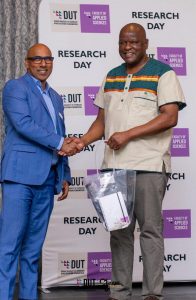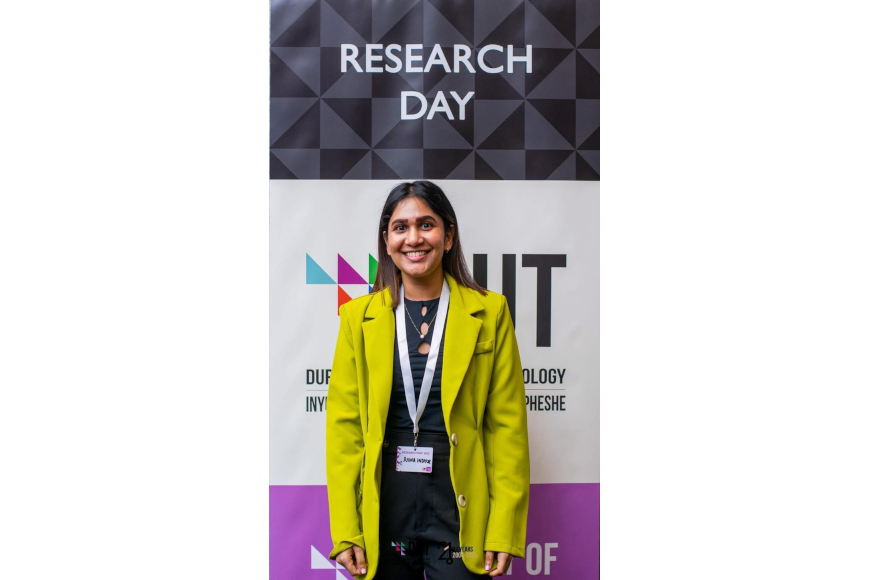The Faculty of Applied Sciences at Durban University of Technology (DUT) hosted its 21st annual Research and Innovation Conference on 5 November 2025 at Coastlands Hotel Musgrave, marking more than two decades of pioneering research, interdisciplinary collaboration, and applied scientific innovation.
The event brought together 200 guests, including 67 presenters, faculty staff, postgraduate students, Heads of Department, industry partners, and research organisations, providing a platform to showcase groundbreaking research, foster partnerships, and demonstrate DUT’s commitment to addressing societal challenges through applied research aligned with its ENVISION2030 strategic framework.
Programme Director Mrs Kameshnee Mellem opened the conference, with Executive Dean Prof Suren Singh reflecting on the Faculty’s transformative 21-year research journey.
“We gather not merely to present findings, but to celebrate the research that defines our Faculty-and the drive to transform complex challenges into tangible solutions that shape a better world, embodying our ENVISION2030 vision,” said Prof Singh.
He emphasised the Faculty’s mission: “From laboratory benches to real-world applications, your research embodies our Faculty’s core mission: to bridge theory and practice, foster interdisciplinary synergy, champion international collaborations, and deliver excellence that matters.”
The Faculty’s research capacity is substantial: 12 Full Professors, seven Associate Professors, over 20 National Research Foundation (NRF)-rated researchers, 30 Postdoctoral Fellows, and approximately 170 postgraduate students engaged in funded research projects across multiple disciplines. Over 80% of the Faculty’s publications appear in Q1 and Q2 journals.
The conference featured 67 presenters, including 24 academics, 13 Postdoctoral Fellows, and 23 postgraduate students. The plenary session showcased three distinguished researchers:
- Prof MJ Moloto (Department of Chemistry) presented on polymer nano/composites for water purification, healthcare, and agricultural applications.
- Prof Ashika Naicker (Department of Food and Nutrition, Associate Professor and Head of Department) delivered insights on improving the South African school food environment through evidence-based pilot interventions.
- Prof SKK Pillai (Department of Biotechnology and Food Technology) examined biomass valorisation for sustainable resource management and circular economy models.
Complementary presentations included Mrs Sindisiwe Nene’s analysis of South Africa’s Sugar Tax impact on consumer behaviour and population health, and Dr Nontokozo Xaba’s research on emerging pharmaceutical pollutants in the eThekwini metropolitan region.
A conference highlight was Dr Riona Indhur (Department of Biotechnology and Food Technology, Institute of Water and Wastewater Technology), recipient of the 2025 NRF Research Excellence Award for Next Generation Researchers. Dr Indhur presented groundbreaking research on microplastic removal from water using innovative, recyclable, non-toxic functionalised nanomaterials.
“Our research philosophy prioritises environmental responsibility alongside technical efficacy. We are developing scalable solutions that protect aquatic ecosystems, support biodiversity conservation, and ensure water security for vulnerable communities,” Dr Indhur said.
Her research aligns with DUT’s ENVISION2030 strategic pillars and addresses multiple United Nations Sustainable Development Goals, including Clean Water and Sanitation (SDG 6), Life Below Water (SDG 14), and Responsible Consumption and Production (SDG 12).
Three concurrent sessions showcased the Faculty’s multidisciplinary expertise across Biotechnology and Life Sciences; Food and Nutrition, Mathematics, and Statistics; and Horticulture, Sports Studies, and Environmental Biotechnology.
 Prof Singh highlighted the collaborative nature of the event: “This Research Day accelerates impact-where a coffee break conversation could lead to a collaborative funded project.”
Prof Singh highlighted the collaborative nature of the event: “This Research Day accelerates impact-where a coffee break conversation could lead to a collaborative funded project.”
Postgraduate students actively presented their work, developing scholarly communication competencies and fostering cross-disciplinary collaboration. Ms Thoko Winnie Malinga, postgraduate researcher, reflected: “Presenting research to interdisciplinary audiences comprising faculty members, industry practitioners, and research collaborators provided invaluable critical feedback and identified potential partnership opportunities that will strengthen my dissertation work.”
The conference concluded with presentations highlighting cutting-edge research methodologies, including Dr Robert Bogadi’s work on curvature and structure scalars in General Relativity, and Dr Indhur’s detailed exposition on microplastic remediation technology with comprehensive recyclability and toxicity assessment.
Prof Alisa Dorasamy (Department of Chemistry) emphasised collaborative research: “The conference provided exceptional opportunity to engage with the breadth of research excellence within our Faculty. Our collaborative work on CO₂ hydrogenation with Mr Sinqobile Mahlaba exemplifies how interdisciplinary partnerships advance sustainable catalysis science.”
The 21st annual Research and Innovation Conference reaffirmed the Faculty of Applied Sciences’ position as a leading research institution within South Africa’s higher education landscape. The event showcased research spanning ten academic departments, demonstrating sustained scholarly productivity, methodological innovation, and commitment to addressing complex societal challenges.
Executive Dean Prof Singh concluded: “Research is our DNA. We are Applied Sciences-not merely as separate disciplines, but as a bridging force for good. Over 21 years, we have not merely generated knowledge-we have translated that knowledge into sustainable, equitable solutions for pressing societal challenges. Together, we are not just advancing knowledge-we are applying it to build a sustainable, equitable, and innovative future, and we are building the next generation here.”
Deputy Dean Prof Tukayi Kudanga delivered the closing remarks, thanking all participants for their contributions to a successful conference that exemplified the Faculty’s commitment to research excellence and collaborative innovation.
Pictured:
Photography: Nompumelelo Mpungose
Silindile Buthelezi

